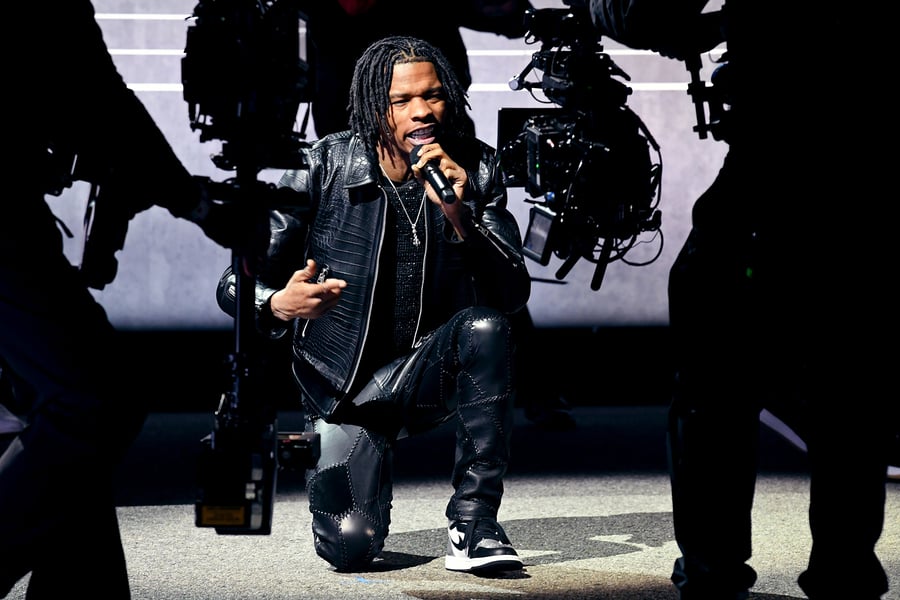When Lil Baby recorded his Grammy-nominated single “The Bigger Picture” last year, he didn’t expect people to even like it. “I felt like the song was going to be slept on,” he tells Rolling Stone, one day after he performed the song as part of the Grammys’ most politically charged moment. The show included a choreographed re-enactment of the police shooting of Rayshard Brooks, who was killed during a police stop at a Wendy’s in Atlanta. The case was personal for Lil Baby, who says the Wendy’s where it happened was a part of his own childhood.
“I already knew I was going to perform ‘The Bigger Picture,’ so I wanted to make a performance that kind of meant something,” he says. “So I went with that because I’m all the way familiar with that situation.”
The performance had been in the works since last summer and marked the debut for director Fatima Robinson, who says she was brought on as one of the show’s creative producers this year. “Normally I’ve been brought on as a choreographer, or creative director, or back in the day I danced, but this was like being involved in the entire show,” she says. (Robinson is still something of a Grammy veteran, having worked on iconic performances from everyone from Pharrell to Kendrick Lamar, whose 2016 performance had a similar political undertone.)
Lil Baby’s performance grew out of a number of conversations with all of the parties involved. Quality Control Records CEO Pierre “P” Thomas had a hand in the choreography. “I wanted to reenact what actually happens in situations of police brutality, which is an issue that black communities have been dealing with for generations,” Thomas says. “The murder of Rayshard Brooks happened in Atlanta and hit home for both me and Lil Baby. The goal for this performance has always been to bring it to the Grammy stage.”
For Lil Baby, it was unlike anything he’s been a part of so far. “I was excited. And I don’t really get excited too much about anything,” he says. The actor Kendrick Sampson, who depicts Brooks in the performance, was also part of discussions about the project. According to Robinson, he was central in making the piece about more than just violence for the sake of it. “Kendrick was part of the conversations we’re having to make sure it wasn’t a gnarly, uncomfortable shooting scene that it depicted,” she explains. “There were just a lot of conversations being had around the whole thing to make it feel right.”
Not everyone was impressed with the rapper’s performance, with some on social media saying that that it served to commodify police violence. Robinson says the intent was to handle the issue with care. “CBS and the Grammys gave us the creative license to reenact the scene, but we also wanted to make sure that we did it in an artful way,” Robinson explains. “That’s why James Baldwin is playing on top as he’s getting arrested, just to understand the history of where we stand as black people in America.” Thomas sees the reenactment as an essential part of continuing an important conversation. “If we don’t continue to keep it in the forefront of people’s minds then these stories will continue to get swept under the rug,” he says.
For Lil Baby, it was a moment where he felt like his music could be part of something bigger. “I feel like I’m serving my purpose,” he says. “I’m not saying my purpose as a rapper is to only do this. But to get my word out; to speak on stuff that I know people in my culture go through. I feel like I’m using my voice as it needs to be.”
The performance culminated with a speech from the activist Tamika Mallory in which she addresses the president directly, calling for racial justice and policy measures to ensure a more just society. It was a rare moment for the Grammys, where more than just gesturing towards a political message, it was an active participant in something akin to a protest.
“It was all about doing this performance in what’s happening now. Let’s use this as a platform to ask for what we are looking for, what we need,” Robinson says. “That’s why I rooted for Tamika Mallory because she is such a direct person that I felt like this movement and this time needs leaders who aren’t afraid to speak up for what people are asking for.”
From Rolling Stone US






































